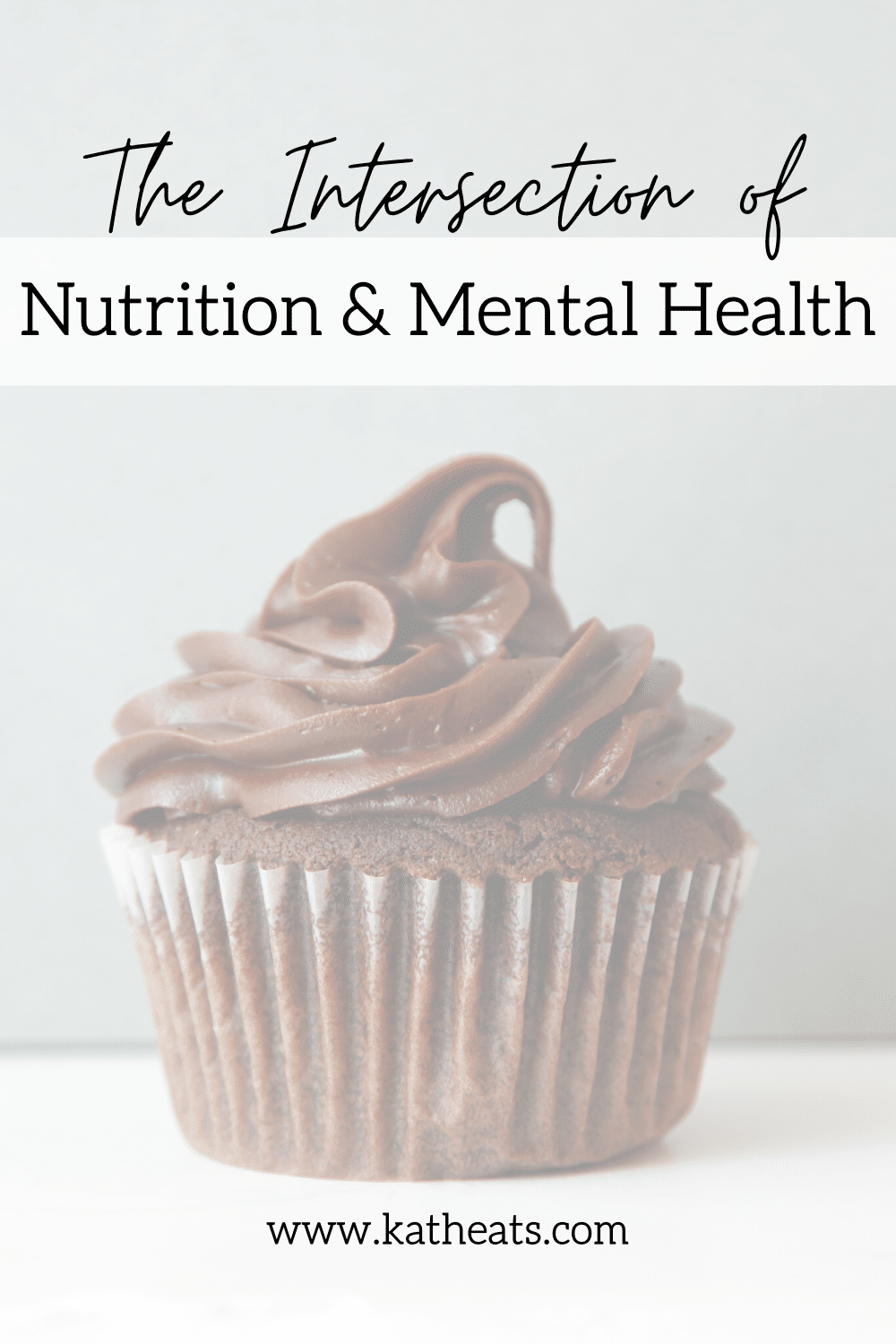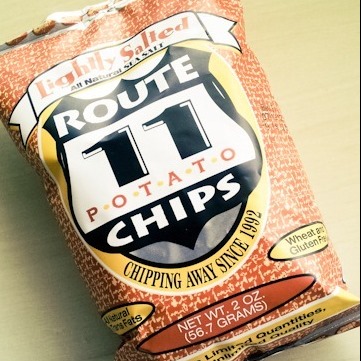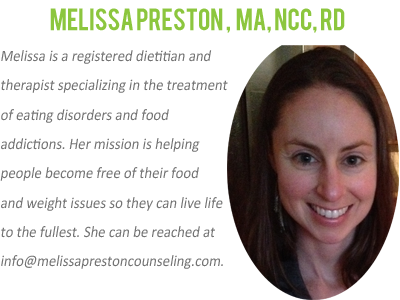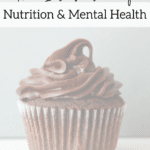How does food influence our mood and where is the intersection of nutrition and mental health? A registered dietitian answers your questions.
How does food influence our mood?
Do you use food to deal with your emotions?
Do you ever feel guilty for eating something?
When you look in the mirror, what do you see? Do you berate your body and think to yourself “today I start over with that diet?”
Do you ever ‘numb out’ while eating and then all of a sudden realize you ate the entire bag of chips?
Read on to find ways to stop these behaviors!
Picture this scenario: You’ve just had a stressful day at work. Your boss yelled at you for not getting something in on time, you spilled coffee on your favorite shirt, and you said something in a meeting that your colleagues didn’t agree with. You leave work and think to yourself “I’m a failure. I can’t do anything right.”
You had planned to go to the gym after work but you feel so exhausted and drained from the day that instead, you drive home and dive head-first into the potato chip bag. You turn on the TV and finally get to “numb out” from the day, and for about 30 minutes you actually forget about the bad day you had. The next thing you know you’ve eaten the entire bag of chips.
Now, on top of feeling bad about the day you had, you also feel bad about yourself for eating the entire bag of chips, you now “feel fat”, and have to vow to start over tomorrow with healthy eating habits. The inner dialogue might go something like this: “How could I have eaten the whole bag? I’m so fat I have no self- control. Tomorrow I will start over with my diet and eat super healthy. I can’t believe I did that! I am not only a failure and stupid at work but also I am fat and have no self- control. Well now that I’ve already messed up for the day I might as well continue and eat that leftover piece of chocolate cake.”
Does this sound familiar? Often our moods, emotions, and feelings influence our food choices. It is ingrained in us to eat when we feel sad, happy, anxious, upset, lonely, etc. Not only does our society encourage us to eat when we feel emotions as seen here, here, and here, but we also have psychological and physiological pathways that reinforce that eating certain foods when stressed makes us temporarily feel better. {See: Emotional influences on food choice: sensory, physiological and psychological pathways}
The problem with using food to deal with our feelings and emotions is that it doesn’t work! The trouble with emotional eating (aside from the health issues) is that once the pleasure of eating is gone, the feelings that cause it remain. That is why it is useful to know the difference between physical and emotional hunger, and how to deal with emotional hunger when it comes up.
This is useful graph to recognize the difference between physical and emotional hunger:
{Source: KidsHealth.org}
So going back to our scenario of leaving work and feeling emotional hunger, how do you deal with it? I use a combination of mindfulness, acceptance {learn more here}, and distress tolerance skills with clients.
Mindfulness is not as complicated as it sounds. It means simply being present and mindful of your current situation. Being present means not thinking about the past and how you could have done or said something different. Also, it means not thinking and worrying about the future. It is being in the present, right now, in this moment. Simply pausing for a moment and reminding yourself where you are (I am in my car) and that you are no longer at work is enough to bring you in contact with the present moment.
When we are in contact with the present moment we are better able to practice acceptance and actually deal with our emotions, rather than stuff them down with food. Acceptance means fully accepting the present moment and what you are experiencing. For our earlier example this would something like this: “I feel really bad right now about my day. I feel vulnerable and bad about myself for saying something in the meeting that people didn’t agree with, but it’s okay. I accept this feeling and know that it will not kill me. It is just a feeling and it will pass”.
Acceptance is often a difficult concept for many to understand because we are taught from a very young age to do something about our ‘negative’ feelings to make ourselves feel better. But the fact is, feeling sad, lonely, scared, vulnerable, etc, are all NORMAL feelings. Everyone feels them at times regardless of how happy they seem on Facebook.
The key is to understand and accept that our feelings are just that – feelings. Actually feeling them will not doom you to a life of unhappiness or loneliness. Usually any feeling we have will not last more than 30 minutes. Simply notice the feeling, accept it and let it go. Research has shown that the more we try to fight our feelings the longer they actually stick around.
Another set of skills I teach clients are called distress tolerance skills. What this means is basically how to tolerate the moment better by using a variety of different things. For some people, they find it best to distract themselves while feeling emotional hunger and do something else such as clean, call a friend, or go for a walk. Others might find that doing something soothing for themselves is helpful such as taking a bath, listening to music, or smelling a lavender candle (using your senses to sooth).
Whatever skill you choose to try please remember that it takes time and practice to do something new and different! The more you practice the easier it will become. If you find that it is difficult to implement these strategies on your own then ask for help! When you are able to live a life free of emotional eating you will find that you are able to live a healthier, happier life!
If you liked this post please visit me at my blog at www.melissaprestoncounseling.com/blog.
Other Posts On Mindset







Anele @ Success Along the Weigh says
This is a great post and definitely one I think many can benefit from! Emotional eating can be a tough one to reason through in the moment but this helps.
Tasha says
I shared your blog, via my blog 🙂 Thank you for this post. http://phatandfit.com/2014/01/16/have-you-ever-binged/
Melissa Preston says
Thank you for reposting the article Tasha!
Katie @ Peace Love & Oats says
LOVE this post! I’m definitely having problems with emotional eating right now (not finding a job after 5 months of searching can do that to you…) so I really need to work on dealing with my emotions rather than burying them in epic amounts of popcorn or peanut butter…
Chelsea @ TableForOne says
This is such a great post! I think emotional eating is one of those things that many people struggle with, but no one wants to admit. I love your advice on mindfulness and acceptance. I choose to eat mindfully and feel that it helps me know my true hunger and satiety signals. I am aware of how the foods I am eating affect my body and it helps me to choose to nourish my body with whole foods and not junk that makes me feel good for one minute.
Janelle says
Really important / relevant post – thanks for sharing!
Melissa Preston says
Thanks so much for letting me be a guest today Kath!
KathEats says
Honored to have you!
Livi says
I love this post. so eye opening and a wonderful reminder of being mindful!
simple green moms says
Great post! As always we love your BALANCED point of view on nutrition =)
Patricia says
This is JUST what I needed to read today. Thanks Kath and Melissa!
Michelle @ A Healthy Mrs says
Great post! I can always use a reminder about these types of issues!
Alex @ Kenzie Life says
I really love this series, Kath! This post was no exception, and Melissa’s approach sounds really similar to DBT/CBT treatments, which I really love. As someone recovering/ed (I think it’s a process) from anorexia, I think that nutrition and mental health are obviously important topics that play off of each other. In my own recovery, I’ve found that I needed to redefine healthy to include both nutritious foods (even if they are calorie dense) but not be so focused on eating “well” that I don’t let myself have other foods that I also want that may not be that nutritious. I think the best thing is being able to go to a restaurant and order what I’m craving, and eat all of it if I want to. I’ve also found that certain foods really helped boost my mood (I’m not discounting a placebo effect here–that could be it too). I find that I’m healthiest and happiest when I make my food choices based on what I need to fuel my body for the activities I’m a part of, as well as sometimes just eating what I want, even if it’s not “healthy”. And sometimes what I want is a delicious cheesy pizza from Dominos with a beer (or hard cider) so I let myself have it 🙂
Rosamund says
Great post, I know I have struggled with this in the past but now I have managed to change these feelings and stop myself from over eating or not exercising. When I am upset about something (or someone) and just want to skip the gym or eat junk I tell myself ‘I am not going to let this situation or person ruin my health, they can’t take my workout away from me.’ It sounds silly but in a small way it makes me feel more in control of what’s going on and a little stronger.
Lea @ Healthy Coconut says
Thanks for this post, I learned something new.
I work in an environment where I can get any type of food very easily. Very bad during days when I’m stressed. I usually keep soothing teas nearby to help me calm down from whatever stressful moment I’m in, but after reading this….I think I want to get a lavender scented oil for my office 🙂
steve says
This is such a great post Melissa and Kath. Here at CureLauncher, we think Melissa really ‘gets it’ – that mind and body really are completely connected and mindfulness is a healthy way to live fully as a human. One person who ‘stands up’ and speaks these deep truths from her heart is always followed by wave upon wave of people.
Thanks for sharing your personal efforts Melissa, it is so encouraging and helpful.
Eva says
Insightful post 🙂 in the past year, i’ve noticed that i’ve become much more mindful and acceptant of my emotions and thoughts of the moment. it’s a very powerful tool to be able to know how you feel and not to let that control you. much more effective than feeling powerless and therefore needing to exert outward control to everything around you.
Katya says
Melissa – beautiful post. It took me a while to realize that eating disorders are related to our emotional/mental states. It was ingrained in me at an early age – that food was a reward. It takes a while for people to face the fact that they may be eating emotionally. Primarily, the person really has to be true to oneself to understand that nothing is outside of himself/herself. Healing from the past, uncovering limiting beliefs and challenging them are all interrelated, Those subconscious beliefs drive behavior – automatically. So, mindfulness is crucial. You are right it does not have to be treacherous – it is just simply being present. Wonderful post. Please keep writing because you are helping so many people really tap into the truth of the matter. Sometimes quickly, sometimes slowly – results in people’s lives will manifest. Thank you!!!
Jeannette says
What about the opposite side of this issue?….NOT eating because of emotions and stress. I feel like this topic is avoided (or a different issue entirely?) when talking about emotions and food.
Mallory says
This is a good post, but for some emotional eaters (like myself), I find distress tolerance skills very hard to implement. I can think of a lot of other things to do besides eat when I get the urge to emotionally eat. But because part of emotional eating is highly compulsive (or maybe I am conflating two very different things? Perhaps you can clarify..), it becomes very VERY hard to say “Oh I’ll just take a walk” or “Oh I’ll just call a friend instead.” It is like having an itch, pausing, and then deciding to not scratch it. I think I am more of a compulsive eater than an emotional one, but the two go hand in hand. Or maybe I’m just confusing myself now 🙂 All thoughts welcome!!!